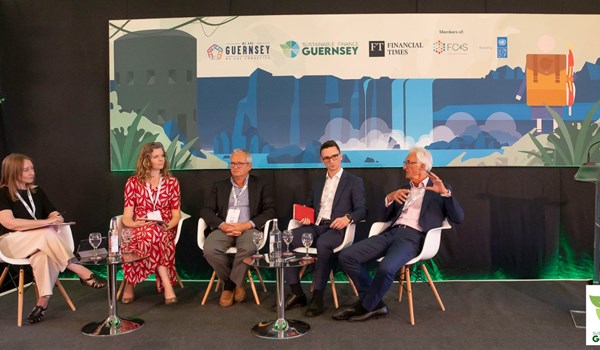Jurisdictions
Regions
Industry Sectors
22/09/23
Conference urged to ‘work with nature, not against it’ on second day of Sustainable Finance Week

Press Release from We Are Guernsey, Friday 22 September, 2023.
Attendees at the second and final conference day of Sustainable Finance Week were urged to embrace their inner David Attenborough as the day’s discussions focused on biodiversity.
The session began with a no-punches-pulled keynote speech from Dr Gemma Cranston, Executive Director of Pollination Group.
She began with some sobering statistics on biodiversity loss – 83% of wild mammals have been lost due to human degradation, an estimated one million animals have gone extinct due to human activity and $44 trillion, the estimated total economic value of nature on an annual basis.
"We simply can't exist unless we have nature there to underpin us, and biodiversity underpins nature," said Gemma.
Describing the Taskforce on Nature-related Financial Disclosures (TNFD), a risk management and disclosure framework for organisations to report and act on nature-related risks, which was launched in 2021, as ‘an incredible starting point’, Gemma said: "This is the first time we are going to have a framework that allows corporates and financiers to understand how they can report on risks and opportunities associated with nature." But she warned that there is still a huge amount to be done in this area.
“So, channel your inner David Attenborough, but also let’s get commercial about this and find out what the real market opportunities are. To work with nature, rather than against it. I think we need true systems change and the only way to do that is collaboratively with passion and ambition.”
Discussions on natural capital continued with the first panel session, Business Models for Natural Capital, featuring Gemma Cranston, Ian Dunn, Chief Executive of Plant Life, James King of PwC and Andrew Mitchell, founder of Equilibrium Futures.
Ian told the audience: "You in this room have a fundamental ability to drive change. We have to give nature space, and enable it to be resilient, healthy, and thriving. We have to bring nature into the economy as a monetary value.”
On the subject of biodivesity footprints, James said that although nature is complicated, a baseline should be established.
"What gets measured gets managed,” he said. “[however] it would be a great shame if it becomes an annual reporting stamp. That's not going to be enough."
The reaction to TNFD has been mixed, said James. He referred to ‘ESG exhaustion’ but said: "It's crucial that there is a concerted effort to engage."
The panel discussed wealth transfer from one generation to the next and the need to recognise the difference in values between baby boomers and Generation X and those following after.
Andrew said: “The numbers are huge, $35-68 trillion over the next decade, so it’s a huge change and very interesting because young people care about this stuff more than women do and more than men do. So, there is going to be a huge shift in capital and the way capital is deployed.”
The second panel focused on innovative investment asset classes and featured Richard Burrett of Earth Capital, Chris Villiers of Respira International and Kate Rogers from Cazenove Capital.
Discussion centred around externalities, with Richard saying: "We've known for a long time that social and environmental externalities matter from a risk perspective.”
“It’s a scaling up challenge we’ve got at this point,” he added.
Kate said there are potentially massive opportunities arising from the intergenerational transfer of wealth.
“New holders of wealth are much more purpose driven, values driven and therefore have ideas about what they want to avoid, where they want their capital allocated and they want to feel values alignment with their investment portfolio.”
Chris said there is a “huge amount” of discussion with investors around nature, carbon credits but encouraging investors to put their capital at risk remains a challenge.
“Carbon markets are undergoing growing pains but appetite to be bold and step out of what peers are doing is not really there from what we have seen. Where we are trying to raise capital is from corporates and we are seeing more traction with that.”
Richard said it is essential to look at technologies that are bringing about radically efficient change to protect resources such as fresh water supply.
“We invest in the world’s lowest water use toilet. There are investible things out there that will make a difference but we need to think about what the water sector will look like in 2050 when there will be 2 billion more people on the planet. It's a massive investment opportunity but one where you have to be aware of the externalities and limits of.”



